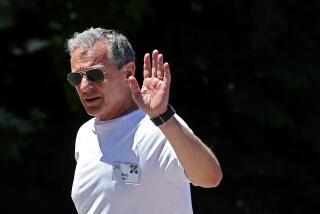Search Is On for Grasso Successor
- Share via
NEW YORK — The New York Stock Exchange took steps Friday to find a new leader as it continued an increasingly public debate over how to make the Big Board more responsive to the world beyond Wall Street.
The NYSE board named director Laurence D. Fink, chairman of New York money-management firm BlackRock Inc., to head a nine-member search committee to find an interim chairman to replace Richard Grasso, who was forced out Wednesday amid an uproar over his $140-million compensation package.
At least two NYSE directors, Silicon Valley lawyer Larry W. Sonsini and New York pension-fund executive Herbert M. Allison Jr., have turned down the post, according to a person familiar with the situation.
The NYSE needs an interim chief partly because it hasn’t yet decided whether to split the top job -- as some critics have recommended -- to reflect the dual and often conflicting responsibilities of managing the stock exchange and regulating it.
The possible job split is one of several structural issues the NYSE confronts as it marches toward an Oct. 2 deadline to deliver a report to the Securities and Exchange Commission outlining steps it will take to repair the corporate-governance problems that some say led to the crisis over Grasso’s pay.
Another reason to choose an interim leader is to have a credible person in place quickly to add his or her endorsement to the governance report, according to two people familiar with the board’s thinking. Thus, the search committee will proceed “with all deliberate speed,” one of those people said.
Many names have been floated on Wall Street and in the media as potential permanent successors to Grasso, including former Treasury Secretary Robert E. Rubin, former SEC Chairman Arthur Levitt and William J. McDonough, chairman of the new Public Company Accounting Oversight Board.
Those three and others have said they weren’t interested in the job. The NYSE hasn’t offered the permanent chairmanship to anyone, according to a person familiar with the situation.
Henry M. Paulson Jr., chairman of Goldman Sachs & Co., this week proposed amending the NYSE constitution to bar executives of securities firms or of companies whose stock trades on the exchange -- Goldman is both -- from serving on the NYSE board.
Such a change would address a much-noted conflict of interest: Nearly half of the directors who govern the Big Board run companies that are subject to its regulation.
Under Paulson’s proposal, as described by a person familiar with it, an advisory committee would be created to give the securities firms a say in non-governance matters such as trading rules. “After all,” the person said, “they’re the people who use the NYSE. It wouldn’t be acceptable to leave them without a voice.”
Paulson’s ideas encountered some opposition on the board and are by no means certain to be included in the governance committee’s final recommendations, the person said. However, they jibe with reforms proposed by NYSE critics such as Sean Harrigan, president of the board of the California Public Employees’ Retirement System, the nation’s largest public pension fund.
NYSE director H. Carl McCall, who heads the committee drafting the corporate-governance report and has functioned as lead director since Grasso’s resignation, has invited a group of the exchange’s critics to a meeting of his committee in New York on Wednesday.
Those invited, according to McCall spokesman Steve Greenberg, include Harrigan; Phil Angelides, California’s state treasurer; Jack Ehnes, chief executive of the California State Teachers’ Retirement System; and New York state Comptroller Alan Hevesi.
It could not be learned late Friday whether McCall’s previously announced trip to California next Friday to meet with Angelides, Harrigan and others would still occur.
As it ponders its future structure, the NYSE must also contend with some old business: the question of Grasso’s severance pay. According to his 24-page contract, which runs though 2007 and was made public this month, Grasso is entitled to up to $57 million in severance if his departure is deemed to be for “good reason.”
That figure includes $48 million in future compensation that Grasso agreed to forgo this month in an effort to stem the growing controversy over his compensation.
If the board determines that Grasso’s termination was not for good reason, he would be owed severance dating back only to the signing of the employment contract last month.
McCall said Thursday that the board had not yet determined Grasso’s severance. Greenberg said the issue had not been discussed at Friday’s board meeting and still remained to be settled.
More to Read
Inside the business of entertainment
The Wide Shot brings you news, analysis and insights on everything from streaming wars to production — and what it all means for the future.
You may occasionally receive promotional content from the Los Angeles Times.










